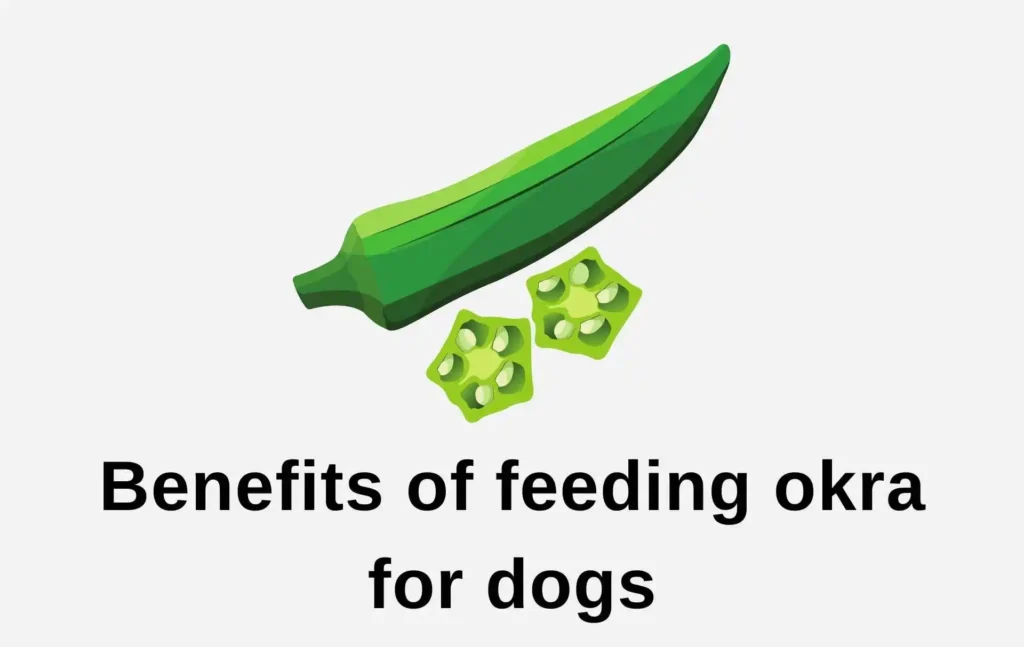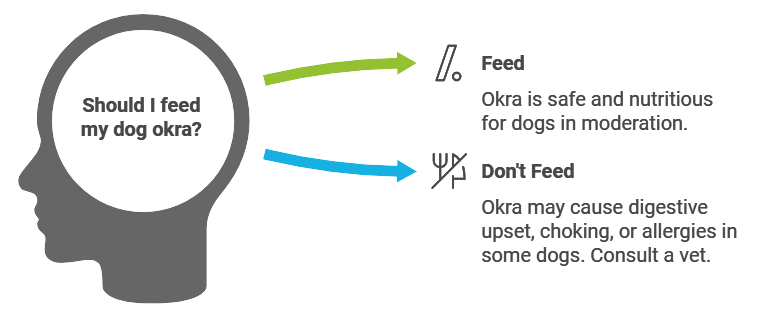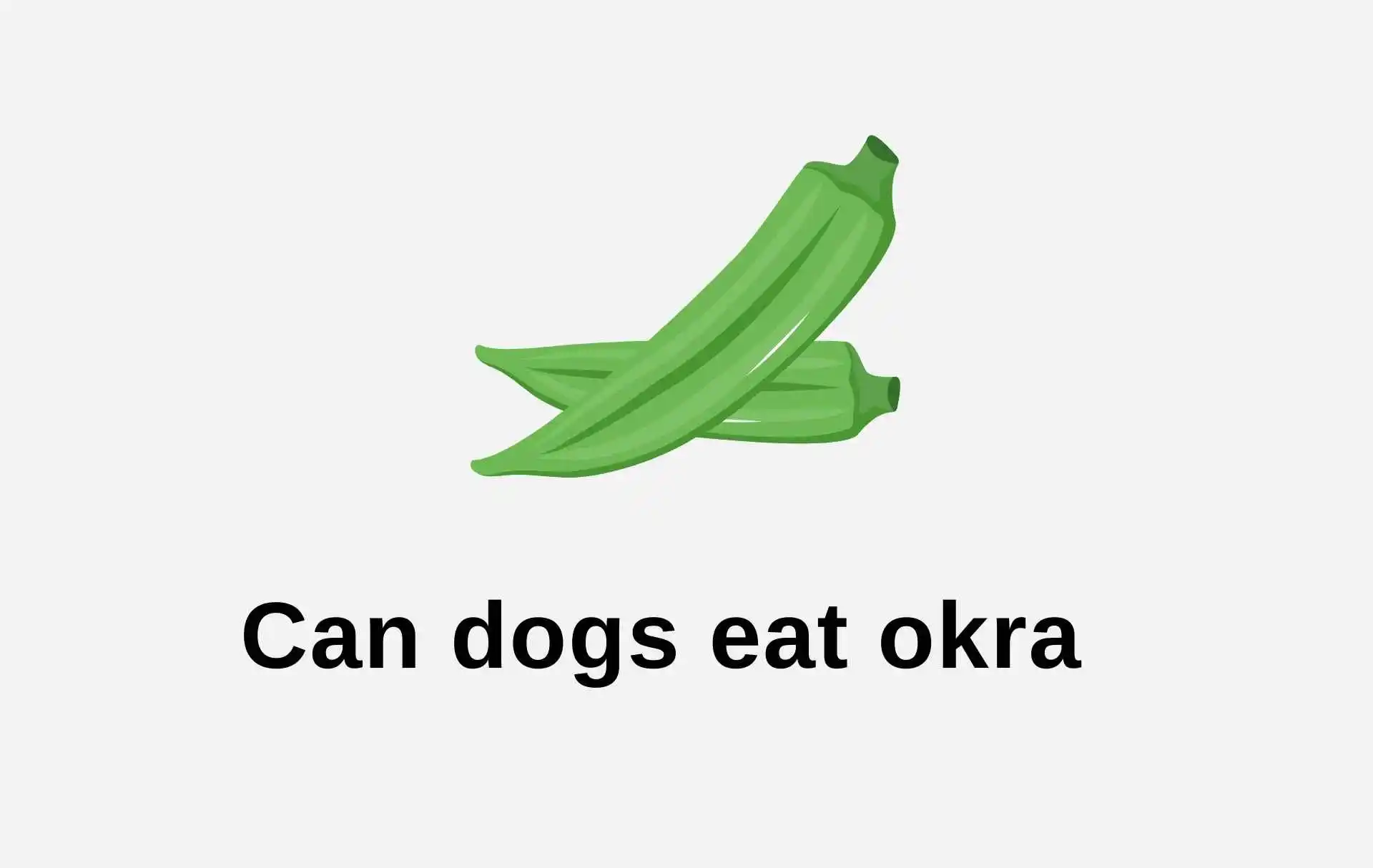Okra is a nutritional vegetable that dogs can eat. As dogs cannot digest raw mucilage fiber well, gently steamed okra is a better option that is still low-calorie. Introducing okra to dogs should always be done in small, supervised portions at first in case an individual has sensitivity.
Monitor for signs of gastro upset like loose stools. Frequent consumption is not recommended due to okra’s laxative effect in large amounts. Chewing should be overseen to avoid choking on the pods.
When given sparingly as treats for their antioxidant and prebiotic properties, okra can safely provide dietary variety for most pups. However, dental checks should still occur regularly even with non-toy snacks. As with any new food, consult your vet if you have concerns about your dog’s dietary needs. With precautions, dogs can enjoy okra’s nutrients without digestive risk in moderation.
What is Okra?
Okra has gained popularity as a vegetable treat that provides nutritional value for dogs. Native to Africa and introduced to North America, the green seed pod of this hibiscus plant has earned its place in some canine diets. When properly prepared and fed occasionally in moderation, okra offers dogs benefits through its fiber, vitamins and minerals. However, owners need information on introducing it safely and cooking methods that maximize digestibility.
Can dogs eat okra
Okra is generally safe for dogs to eat in small amounts. However, raw okra pods contain a sticky mucilage that can upset some dogs’ stomachs if too much is ingested. For this reason, lightly steamed okra is better tolerated. Like any new food, introduce okra slowly and monitor your dog for signs of diarrhea.
Too much fiber from okra could potentially cause gas or GI issues in dogs that are sensitive. Only feed small, supervised pieces and don’t use okra as a frequent or main part of their diet. Most dogs can enjoy okra in moderation as a healthy vegetable treat when steamed. As with any human food, check with your vet first if you have concerns about your specific dog’s dietary needs.
How to prepare okra for dogs
When preparing okra for dogs, proper handling and gentle cooking methods are important. Rinse the pods thoroughly before lightly steaming them for 5-7 minutes. This softens the mucilaginous fiber inside, making digestion easier.
Allow the cooked okra to cool completely, then serve as snack-sized pieces under supervision. Do not overcook, which causes mushiness, and avoid sautéing which can produce extra residues.
Only offer the okra occasionally and monitor dogs that have not had it before for signs of diarrhea from the soluble fiber. With cautious introduction and correct preparation, steamed or baked okra can provide nutritional benefits as an supervised snack for many dogs.
Nutritional value of okra for dogs
Here is the nutritional information for okra in a table format:
| Nutrient | Amount per 1 cup (155g) of cooked okra | Benefits |
| Fiber | 5.6g | Helps digestion and bowel regularity |
| Vitamin C | 28.5mg | Boosts immune system and collagen production |
| Vitamin A | 154.5IU | Supports vision and cellular function |
| Vitamin K | 50.4mcg | Essential for blood clotting and bone health |
| Folate | 51.4mcg | Required for cell growth and DNA/RNA synthesis |
| Calcium | 25mg | Important mineral for bones, teeth and more |
| Magnesium | 38.6mg | Supports energy production, muscle function |
| Potassium | 575mg | Regulates fluid balance as an electrolyte |
| Protein | 1.6g | Provides amino acids for various processes |
Okra is a source of many vitamins, minerals and fiber that promote overall health and wellness when consumed occasionally by dogs in small amounts. The nutrients provide benefits to digestion, immunity and more.
Benefits of feeding okra for dogs

Dogs can eat Okra because it has following nutritional properties that can benefit dogs when incorporated occasionally into their diet.
Immune System Support
They’re full of important antioxidants like vitamins A, C, and K that act as little fighters against cell damage. See, anytime your doggo’s cells are doing their thing and producing energy, there’s a chance of molecules called free radicals forming. If left to run wild, these free radicals can damage cells over time.
Hydration and nutrition
With a high water content, okra supplies hydration to dogs physically and through its fiber content. This makes it a more filling snack between meals for energetic dogs. Minor amounts of protein, vitamins and minerals pack nutritional value into each pod too. This provides dietary balance and variety in an interesting texture dogs enjoy.
Laxative Effects and Gut Health
The soluble fiber in okra has gentle laxative properties that may assist with softer stool and more regular bathroom habits in some dogs. Regular bowel movements aid detoxification and prevent pesky constipation issues. At the same time, okra fiber nourishes gut microbiota to balance its community and support overall digestive wellness.
Potential for Weight Management
As an low-calorie option, small portions of okra fed as supervised snacks supply fiber for feeling full without excess calories that could lead to weight gain. This makes it a beneficial addition during dietary phases aimed at maintaining a healthy weight for dogs. Modifying feeding amounts adjusts this benefit carefully.
Risks and safety precautions of feeding okra for dogs

While okra can provide benefits when prepared properly, there are safety factors pet parents must consider. Just like any new addition to a dog’s diet, potential risks exist that responsible owners can mitigate through proper introduction and monitoring.
Potential Digestive Upset
Raw okra contains mucilaginous fiber that may cause gastrointestinal upset in dogs if consumed in excess. Cooking reduces this fiber, but dogs new to okra need gradual adjustment. Too much soluble fiber at once could lead to gas, diarrhea or other digestive issues in sensitive pets.
Risk of choking
Those things are like giant fuzzy cylinders – perfect for causing an accidental choke if he tries to wolf it down too fast! I always slice mine into little half-inch pieces so there’s no risk of something getting stuck. You wouldn’t want your good boy struggling to breathe while you panic about the Heimlich.
Taking that extra minute to prep his treats safely is so worth it for peace of mind. Make sure to watch him closely while he’s crunching too, just in case. Ain’t no okra worth the risk to his health!
Allergies or Sensitivities
it’s possible – though not super common – for some pups to develop an allergy to okra over time. All it takes is one bite of something new to trigger skin issues or tummy troubles for sensitive pups. I always do a test run of new foods spaced out, so it’s easy to pinpoint if something’s upsetting my pooch’s belly.
If Ollie starts itching more, or his poops aren’t quite right after okra snacks, I’ll know to avoid them in the future. Maybe he just doesn’t have the tolerance for those green goodies like I thought. Either way, listening to his body is the way to go.
Monitoring Intake Amounts
Too frequent or excessive feeding of okra could potentially cause diarrhea or other issues from the laxative fiber content. Slow introduction and strict regulation of portions is required to reap benefits safely.
Avoid Undercooked Okra
Only serve okra that has been properly cooked until just tender. Any trace of raw okra in dog food poses further risks to their gastrointestinal health. Through mild preparations, owners can reduce the inherent risks.
Consult Your Veterinarian
Any concerns regarding suitability of okra for an individual dog’s needs requires veterinary guidance. They can help determine if okra works for each dog’s unique system based on risks like pre-existing conditions.
Proper handling and limited intake are key to minimizing potential risks from okra. Diligent owners introducing it judiciously and carefully monitoring their dog’s responses help make it a generally safe treat nutritionally for most pets.
Better alternatives than okra for dogs
Here are some better alternatives to okra as occasional treats for dogs:
Carrots . High in fiber and beta-carotene, low-calorie carrots are easily digestible and support dental health.
Green Beans . Crunchy yet tender raw green beans provide vitamins, minerals and antioxidant compounds. Their fiber also helps regulate bowel movements.
Broccoli . Nutrient-dense without excessive fiber, broccoli offers calcium, vitamins K and C. Remove the tough stalk and lightly cook the florets so they are easily broken down.
Pumpkin . Loaded with prebiotic fiber, vitamins, minerals and antioxidants that support digestive health in both forms – canned puree for dogs with upset tummies or raw seeds as a snack.
Blueberries . Low in natural sugars and full of antioxidants that may improve cognitive function in senior dogs. Wash a handful for an occasional treat.
Cucumbers . Hydrating, calorie-free cucumbers deliver few digestible nutrients but support joint health. They can be given raw as a snack or filler between meals.
Overall, these fruits and veggies are generally milder on a dog’s gastrointestinal system than okra while still offering nutritious benefits when served in moderation.
Best practices for okra in your dog’s diet
Only offer cooked okra, as the raw Okra can be hard to eat for dogs due to mucilage. Steam or bake pods until just tender. Allow to cool completely before serving. Introduce okra gradually. Give just one small piece at first and monitor your dog reaction. Slowly increase amount over several feedings to let their digestion adjust.
Watch for signs of intolerance like diarrhea, gas or lack of appetite. If seen, discontinue okra treats for that individual. Not all dogs tolerate it equally well. Limit to occasional snacks, not daily meals. No more than 10% of total calories should come from treats. A couple small pieces 1-2 times per week maximum is sufficient.
Always supervise meaty treat times. Cut okra into bite-sized pieces to avoid choking hazards from large pods. Monitor eating behavior to prevent bingeing. Consistency is key for digestive health. Stay within recommended serving amounts for your dog’s weight to avoid laxative effects from excess fiber. Consult your vet if you have any concerns about your dog’s health, diet or reaction to new foods like okra. Introduce cautiously and prioritize their wellness.
